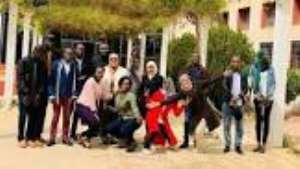
The Pan African University Council is showing new commitment to beef up the institution's achievements while expanding its strategic prospects.
That much was made clear on Friday 29 July 2022, at the African Union Commission Headquarters in Addis Ababa, Ethiopia during the 7th ordinary session of the Pan African University Council.
And judging by what has been accomplished so far, for example, between 2012 and 2021, the University reached out to almost the entire continent, through the award of more than 2,500 scholarships, and tailored its teaching and research portfolio to key issues contained in African Union's Agenda 2063, the prospects of more success are very real.
And in giving an overview of the Pan African University, the President
of the PAU Council recalled that the Pan African University’s mandate
is double: producing world class human resources through high-quality
postgraduate education and instituting research as a pivotal force to
drive Africa’s growth.
Chaired by the PAU Council President, Prof. Kenneth Matengu, the
Session brought together in a hybrid format – through a physical and
virtual attendance – the almost 30 members of the Council, viz.
Prof. Amany El-Sharif, Vice-President of the PAU Council; Prof.
Mohammed Belhocine, Commissioner for Education, Science, Technology
and Innovation; Dr. Monica Masanza Musenero, Minister of Science,
Technology and Innovation of the Republic of Uganda and Chairperson of
the Specialized Technical Committee in Charge of Education, Science,
Technology and Innovation; high-level officials of Regional Economic
Communities; UNESCO; development partners; Directors of PAU
Institutes; Rectors of host universities; representatives of PAU staff
and students and academia.
Staging too was Dr. Monique Nsanzabaganwa, Deputy Chairperson of the
African Union Commission. Staff of the Department for Education,
Science, Technology and Innovation and the PAU Rectorate equally took
part in the Session, as they provided a sound assistance in its
organization.
Dr. Monique Nsanzabaganwa, Deputy Chairperson of the African Union
Commission, officially opened the Session.
She made a strong statement on the importance of the flagship
programme of the African Union, and reaffirmed the Commission’s
commitment to ensure its sustainability. She underscored “the need to
make PAU an international reference and accredited university to the
benefit of the African youth”.
Prof. Mohammed Belhocine, AU Commissioner for Education, Science,
Technology and Innovation, acknowledged the great strides made by the
University in the last decade following its operationalization. He
saluted PAU officials and students for striving to contribute, through
their research works, to designing ground-breaking solutions in key
development areas, to the benefit of the continent.
Topical issues regarding the development and positioning of the Pan
African University across the continent and the world were discussed,
namely : state of the Pan African University; review of PAU budget
execution 2019 – 2021; mid-term report on 2022 execution budget;
presentation of 2021 audit report; implementation plan emanating from
the programme review report; report on key thematic partners
supporting PAU; report on 2023 budget session; presentation of 2022
graduation plan and 2023 academic calendar. Peculiar attention was
equally given to the recruitment of the PAU Rector and Vice-Rector,
whose ongoing process is currently at the short-listing phase.
Moreover, other presentations demonstrated the impressive financial
mobilization of member states in supporting the establishment and full
running of PAU Institutes; and underscored the need to strengthen the
university’s human capital, to achieve its strategic objectives, to
reinforce its financial procedures and to complement the richness and
uniqueness of study programmes to stand the competitiveness across the
world.
And at the end of the Session, Council members commended the
invaluable contributions of member states and key partners in the
development of the Pan African University. They outlined a number of
recommendations to address the pressing issues currently facing the
Pan African University. Globally, they pointed to the need of
improving the staffing structure of the Pan African University,
streamlining its administrative and financial management, furthering
discussions on the review of the PAU Statute, building its
international credence, reinforcing its partnership with academia and
the professional milieus within and above the continent.




 There’s nothing you can do for us; just give us electricity to save our collapsi...
There’s nothing you can do for us; just give us electricity to save our collapsi...
 Ghanaian media failing in watchdog duties — Sulemana Braimah
Ghanaian media failing in watchdog duties — Sulemana Braimah
 On any scale, Mahama can't match Bawumia — NPP Youth Organiser
On any scale, Mahama can't match Bawumia — NPP Youth Organiser
 Never tag me as an NPP pastor; I'm 'pained' the 'Akyem Mafia' are still in charg...
Never tag me as an NPP pastor; I'm 'pained' the 'Akyem Mafia' are still in charg...
 Your refusal to dedicate a project to Atta Mills means you never loved him — Kok...
Your refusal to dedicate a project to Atta Mills means you never loved him — Kok...
 2024 elections: I'm competent, not just a dreamer; vote for me — Alan
2024 elections: I'm competent, not just a dreamer; vote for me — Alan
 2024 elections: Forget NPP, NDC; I've the Holy Spirit backing me and nothing wil...
2024 elections: Forget NPP, NDC; I've the Holy Spirit backing me and nothing wil...
 2024 elections: We've no trust in judiciary; we'll ensure ballots are well secur...
2024 elections: We've no trust in judiciary; we'll ensure ballots are well secur...
 Performance tracker: Fire MCEs, DCEs who document Mahama's projects; they're not...
Performance tracker: Fire MCEs, DCEs who document Mahama's projects; they're not...
 Train crash: Railway ministry shares footage of incident
Train crash: Railway ministry shares footage of incident
